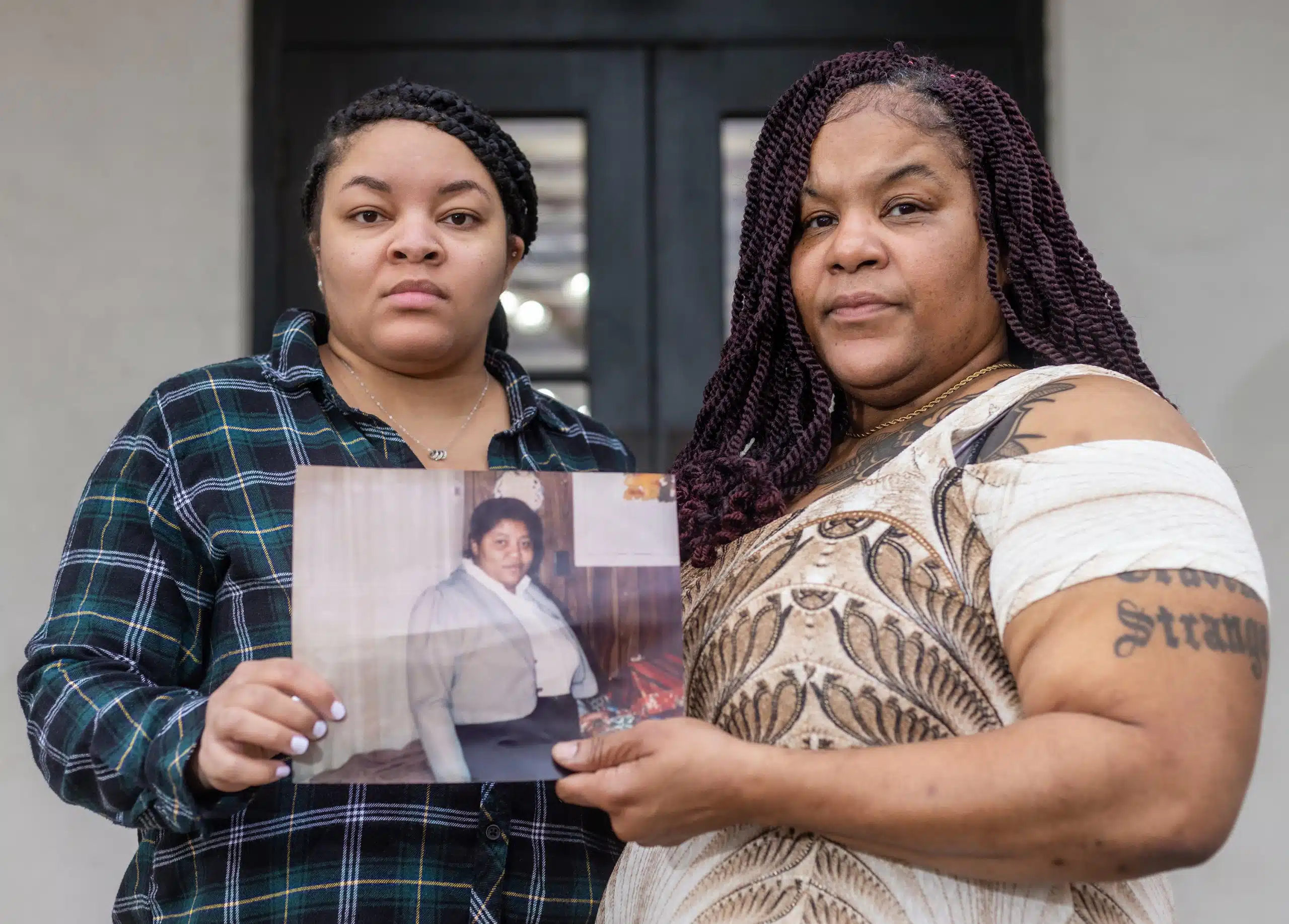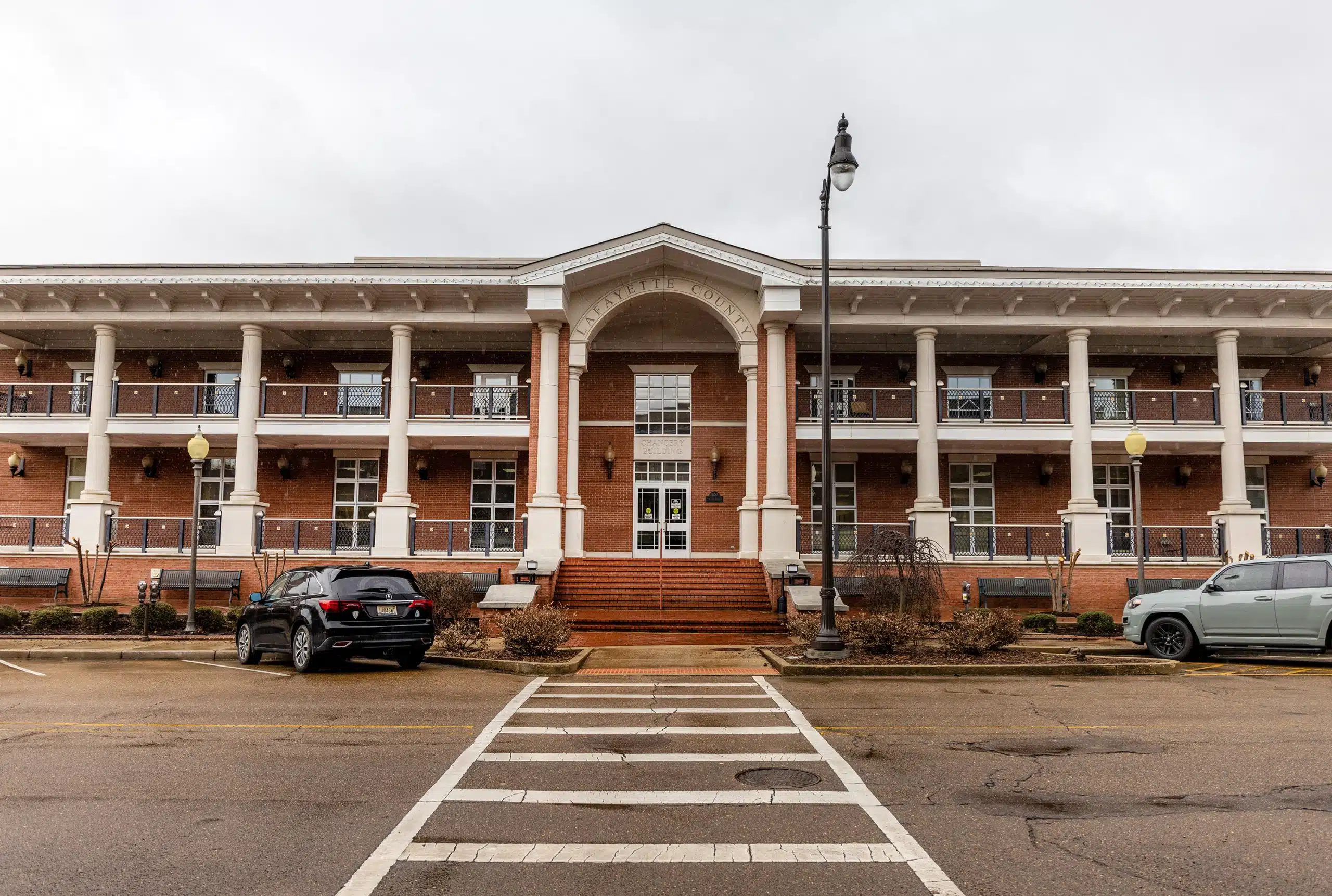Mississippi Today
Mississippi remains an outlier in jailing people with serious mental illness without charges
This article contains descriptions of threats of violence and mental illness. If you or someone you know needs help:
- Call the National Suicide Prevention Lifeline: 988
- Text the Crisis Text Line from anywhere in the U.S. to reach a crisis counselor: 741741
This article was produced for ProPublica’s Local Reporting Network in partnership with Mississippi Today. Sign up for Dispatches to get stories like this one as soon as they are published.
Nearly 40 years ago, a federal appeals court ruled that Alabama officials could not jail people in mental health crisis who were sent to the state for help. Jailing people going through the state’s civil commitment process, the court decided, amounted to punishment. And about 30 years ago, after Kentucky was labeled the worst state in the nation for jailing mentally ill people without charges, legislators there banned it.
But a new survey of counties and an analysis of jail dockets in Mississippi, which has no such law, has found that people going through the civil commitment process for mental illness are regularly jailed as they await evaluation and treatment, even when they haven’t been charged with a crime. Some counties routinely hold such people in jail — people awaiting treatment for mental illness or substance abuse were held in jail without charges at least 2,000 times from 2019 to 2022 in 19 counties alone, sometimes for days or weeks.
Nationally, Mississippi is a stark outlier. Mississippi Today and ProPublica conducted a nationwide survey of disability advocacy organizations and state agencies that oversee behavioral health. None described anything close to the scale of what’s happening in Mississippi.
Civil commitment laws are meant to ensure people get treatment even when they don’t recognize that they need it, said James Tucker, an attorney and the director of the Alabama Disabilities Advocacy Program. Locking them up as they wait for a treatment bed doesn’t fulfill that goal.
“The bargain for your lack of freedom is that the state has decided you need treatment,” he said. “The minute that order is entered, the state has a constitutional duty to deliver treatment.”
At least 12 states plus the District of Columbia prohibit jailing people undergoing commitment proceedings for mental illness unless they have been charged with a crime.
Mississippi law, however, allows people going through the civil commitment process to be sent to jail if there is “no reasonable alternative.” If there are no publicly funded beds in appropriate facilities, local officials sometimes decide they have no other option.
“We Forbid the Use of Jails”
In the 1970s, a federal class-action lawsuit against Alabama officials alleged that it was unconstitutional to jail people going through the commitment process for mental illness while they awaited hearings. It was common at the time: Probate judges in three-quarters of the state’s counties had jailed people, according to discovery findings cited in a court ruling.
Lawyers for the plaintiffs — everyone in the state who had been committed or would be in the future — cited previous lawsuits that had uncovered fire hazards, overcrowding and a dearth of mental health and routine medical care in Alabama’s county jails.
The district court ruled against the plaintiffs’ constitutional claims, reasoning that if the local jail was the only option in a county, it was the least restrictive facility that would also protect society.
“The bargain for your lack of freedom is that the state has decided you need treatment. The minute that order is entered, the state has a constitutional duty to deliver treatment.”
James Tucker, director of the Alabama Disabilities Advocacy Program
But in 1984, a panel of judges on the 11th U.S. Circuit Court of Appeals rejected that reasoning. Circuit Judge Thomas Alonzo Clark wrote in his opinion that nothing prevented counties from placing people in a public facility in another county or in a local private facility that was equipped to handle mentally ill patients.
Clark cited a doctor’s testimony that jail often worsened psychosis, made it harder to treat people and increased suicidal tendencies.
“We forbid the use of jails for the purpose of detaining persons awaiting involuntary civil commitment proceedings, finding that to do so violates those persons’ substantive and procedural due process rights,” the judge wrote.
The reasons that Alabama officials provided for placing people in jail were similar to Mississippi officials’ arguments today. But Mississippi is in a different federal circuit, and the practice there has not been tested with a class-action lawsuit.
A sister of one woman who had died in a Mississippi jail in 1987 tried and failed to convince a federal judge that the woman’s rights had been violated when she was incarcerated without treatment.

Mae Evelyn Boston, an Oxford woman who had dealt with paranoid schizophrenia for most of her adult life, had a psychotic episode shortly after giving birth. Her older daughter, Everlean, was 12 years old; she remembers her mother saying she was going to kill the baby because the girl “had a demon in her.”
One of Boston’s sisters initiated commitment proceedings — making Boston one of more than 100 people jailed for that reason from 1984 to 1988 in Lafayette County, according to a deposition cited in a 1990 ruling by U.S. District Judge Neal Biggers. When deputies arrived to take her mother into custody for evaluation, Everlean recalled, it took six of them to get her onto the ground before handcuffing her and placing her in the back of a cop car.
Once Boston was in jail, guards did not complete a medical screening required by department policy and didn’t know Boston had given birth via cesarean section 12 days before, Biggers wrote. She died two days later from heart failure caused by blood clots.
Everlean Boston remembers her mother smoking cigarettes and listening to the blues on quiet Sundays at home. The day deputies took her mother away was the last time she saw her. “I never got to say goodbye,” she recalled. “I never got to say I loved her. It hurts.”
“I never got to say goodbye. I never got to say I loved her. It hurts.”
Everlean Boston, whose mother, Mae Evelyn Boston, died in jail as she went through the civil commitment process
Biggers concluded that the “medical care customarily provided by the county for mentally ill detainees does not fall below constitutional standards” and that what happened with Boston represented a “scheduling error” and an “isolated instance.” The county, which argued it had provided adequate care for Boston, had the right to detain people like her “in the interest of societal safety,” he found, and those people were not entitled to placement in the “least restrictive alternative” such as a hospital. Biggers considered the Alabama appeals court ruling from a few years earlier, but concluded it didn’t apply because it was based on specific facts about that state’s jails.
“The court declines to hold that use of jails for temporary detention of persons awaiting civil commitment proceedings is unconstitutional per se,” Biggers ruled.
Since then, at least nine lawsuits have been filed over the deaths of Mississippians incarcerated during civil commitment proceedings. None of those lawsuits directly challenged the constitutionality of being jailed during the commitment process. The U.S. Supreme Court has not ruled on the matter, academics and attorneys with expertise in civil commitment said.
In the years after Boston’s death, Mississippi continued to stand out.

In 1992, the National Alliance for the Mentally Ill and Public Citizen’s Health Research Group conducted a national survey about the practice of jailing mentally ill people.
Almost a third of city and county jails in Mississippi responded. About 76% of respondents said they detained people who had not been charged with a crime and were awaiting an evaluation, treatment or hospitalization for mental illness. That was the second-highest percentage of any state in the country and far higher than the national average of 29%.
An unnamed Mississippi jail official said in the organizations’ report that jails were a “dumping ground for what nobody else wants.”
The report gave its “Worst State Award” to Kentucky, where 81% of responding jails reported holding people without criminal charges for mental evaluations.
Two years later, Kentucky’s legislature voted unanimously to ban the practice. The state health agency and its federally designated disability rights organization told Mississippi Today and ProPublica that Kentucky jails today are not used to hold people without charges awaiting mental health evaluations.
Few States Compare to Mississippi
Officials with the Mississippi Department of Mental Health emphasize that they do not support the practice of jailing people during the commitment process. But a spokesperson said they “have heard anecdotally from other states regarding challenges of individuals waiting in jail.”
Nationally, even basic data like the number of people committed each year is elusive. After reviewing some of Mississippi Today and ProPublica’s findings, the Treatment Advocacy Center, a national nonprofit that advocates making it easier for people with mental illness to get treatment, started planning a project to understand how often people are jailed without charges during the commitment process across the U.S.
Mississippi Today and ProPublica contacted agencies overseeing mental health and disability advocacy organizations in every state to find out whether Mississippi is an outlier. It is.
Respondents in 42 states and the District of Columbia said they were not aware of people being regularly held in jail without charges during the psychiatric civil commitment process. In a handful of those states, respondents said they had seen it once or twice over the years.
In two states, people can be sent from state psychiatric hospitals to mental health units inside prisons. In a few others, respondents said they had seen people jailed for noncompliance with court-ordered treatment for mental illness or substance abuse.
Respondents in three other states — Alaska, South Dakota and Wyoming — reported that people sometimes are sent to jail to await psychiatric evaluations, but the information they provided suggested that it happens to fewer people, and for a shorter period, than in Mississippi.
In 2018, staffing shortages at the Alaska Psychiatric Institute caused people to be held at the Anchorage Correctional Complex until they could be evaluated. The next year, an Anchorage judge ordered an end to the practice except in the “rarest circumstances,” finding that it had caused “irreparable harm.”
A subsequent settlement declared that jails shouldn’t be used unless no other option was available and that such detentions should be as short as possible.
But detentions do still occasionally happen in the state when people in rural areas await transportation to an evaluation center, said Mark Regan, legal director at the Disability Law Center of Alaska. According to the Alaska Department of Family and Community Services, people awaiting evaluation were held in jail 555 times from mid-2018 through late February 2023.
Across South Dakota, people without charges sometimes have been held in jail during the commitment process, according to law enforcement agencies and Disability Rights South Dakota, but such holds are limited by law to 24 hours; in Mississippi, the vast majority of cases analyzed were for more than 24 hours. The South Dakota Department of Social Services said it doesn’t track how often it happens and declined to answer questions.
And in Wyoming, a person can be held in jail for up to 72 hours on an emergency basis before a hearing, but they must have a mental examination within 24 hours. Such holds in jail have occurred “in very rare circumstances,” according to the state.
Attempts to constrain the use of jails date back at least to 1950, when the federal government sent governors model legislation that limited the incarceration of people for mental illness to “extreme emergency” situations. The National Institute of Mental Health called incarcerating such people “among the worst of current practices.”
Some states adopted the legislation. Mississippi did not.
This article first appeared on Mississippi Today and is republished here under a Creative Commons license.
Mississippi Today
Ex-MPB leader says ‘Sesame Street’ enriched his young life, but he worries for future of public broadcasting
Editor’s note: This essay is part of Mississippi Today Ideas, a platform for thoughtful Mississippians to share fact-based ideas about our state’s past, present and future. You can read more about the section here.
I was 7 years old when those funny-looking characters appeared on our black-and-white TV set. We lived in what the Tupelo city folk considered the country. If there was such a thing as cable, we surely didn’t know anything about it. The only static-free channel on our dial was the NBC affiliate, and that’s because the station on Beech Springs Road was barely a mile from our house. Suddenly, there was this new station – PBS.
Those funny-looking characters were from this new show called “Sesame Street,” and they had me hooked from the first day. Of course, I was happy to have another TV choice. But this one was different. Skillfully included in the humorous scenes with Ernie and Bert, Oscar the Grouch, Cookie Monster and Big Bird were educational messages that proved educationally life-changing for my family and me.
PBS aired “Sesame Street” – the same PBS that helped teach scores of children in our nation, including me, to read. And it’s the same PBS and member stations that just had their two-year forward-funding appropriation yanked by a $9 billion GOP-led rescission bill that finally succeeded in doing what “Sesame Street” teaches against – bullying.
After a long media career, including more than a decade as editor of The Clarion-Ledger, I spent another decade as executive director of Mississippi Public Broadcasting. It was one of my proudest moments for a kid from Saltillo, a child who came from a family of sharecroppers, to occupy the top seat in public broadcasting in my home state and to ultimately get elected to PBS’s national board of directors.
A kid who admired public media became an executive who ran a statewide operation and helped shape policy nationally. It felt like a dream.
For those who care as much as I do about public media, it is unfathomable, inconceivable and plain dumb – choose your adjective – that both PBS and NPR stations are being picked on, possibly dismantled. And for what? Their financial impact on the multi-trillion-dollar federal budget is minuscule. The inexplicable action carried out by the GOP majority has hurt me deeply. While Republican members run home on recess to avoid further questions about Jeffrey Epstein, my mind can’t get away from the inevitable obliteration of content from local stations that looms.
PBS and NPR are certainly weakened by the passage of the recission, but it will be the rural stations in rural towns without wealthy donors that will feel the most pain. It is a foregone conclusion that some stations already barely getting by will close.
One industry executive described the cuts as “catastrophic, devastating, unnecessary and mean-spirited.” Several stations have already had layoffs and there will be more.
The Corporation for Public Broadcasting, which announced Aug. 1 that it will begin shutting down in September, has been the congressional arm doling out funds to stations since 1967. For years, despite the shortsightedness of some members of Congress, CPB, with the assistance of affinity groups, fought off funding threats and delivered to the 1,500 stations federal dollars that were their lifeline.
Not this time.
The recent action to claw back the $1.1 billion public broadcasting receives over two years is a blow that most likely will place the industry as we know it in an unrecoverable position.
The public media system and local stations have led the way in delivering some of the country’s best programming. PBS, for example, was among the first to bring to viewers travel shows, DIY content, cooking shows featuring cultural icons like the great Julia Child. There’s also Bob Ross, with his soothing voice, who made us all believe that we, too, could paint beautiful landscapes.
The children’s programming, which my grandchildren faithfully watch, cannot be matched by those with commercial interests. It provides a safe place for children, which is not always the case with the others.
NPR frequently sets the agenda for the news of the day – often scooping better-financed media companies – with hosts and producers who have a knack for securing interviews with top newsmakers. Their aggressive reporting has always struck a nerve with thin-skinned politicians. As executive director of MPB, it was NPR that kept my phone ringing with lawmakers threatening to pull funding.
Public broadcasting will survive in some form. It has been wounded, but it has not been silenced. I would not be truthful, however, if I didn’t believe that its strong voice has been reduced to a whisper.
The American people have supported public broadcasting with their viewership and donations, the perfect public-private partnership. But I don’t believe small-town America can keep up. Some larger stations will struggle, as well.
So many people in my circle of friends have given their entire careers to public media. They won’t give up that easily. But they’ve been dealt a bad hand, a setback that has every station accountant working overtime to save as many people as they can.
What do I predict?
Expect to see mostly national programming and fewer local productions. Expect to see talented radio and TV professionals in the job market. But don’t expect to see public media and the ingenuity of its people give up. They will never quit.
Ronnie Agnew was named general manager of New Jersey Advance Media in 2022. He is a Mississippi native who has been in the media industry for more than 40 years. Agnew is a former executive editor of The Clarion-Ledger and former executive director of Mississippi Public Broadcasting. While editor of The Clarion-Ledger, Agnew received four President’s Rings, honoring editors in the Gannett Co. for exemplary performance. He also was honored with the Silver Em from the University of Mississippi. He is also a member of the University of Southern Mississippi Journalism Hall of Fame.
This article first appeared on Mississippi Today and is republished here under a Creative Commons Attribution-NoDerivatives 4.0 International License.
The post Ex-MPB leader says ‘Sesame Street’ enriched his young life, but he worries for future of public broadcasting appeared first on mississippitoday.org
Note: The following A.I. based commentary is not part of the original article, reproduced above, but is offered in the hopes that it will promote greater media literacy and critical thinking, by making any potential bias more visible to the reader –Staff Editor.
Political Bias Rating: Center-Left
The content expresses strong support for public broadcasting and criticizes recent funding cuts led by a GOP majority, framing these actions as harmful and shortsighted. It emphasizes the value of PBS and NPR in education and journalism, which aligns with a center-left perspective that typically favors public media funding and government support for educational and cultural institutions. The critique of Republican lawmakers and concern for rural communities further situates the piece within a center-left viewpoint without veering into extreme partisanship.
Mississippi Today
Brain drain: Mother understands her daughters’ decisions to leave Mississippi
Editor’s note: This Mississippi Today Ideas essay is published as part of our Brain Drain project, which seeks answers to Mississippi’s brain drain problem. To read more about the project, click here.
Back when I was a kid in 1988, my mama and I had an argument about what I wanted to major in at college.
I had dreamed of being a journalist since the age of 8. To me, that meant that I was going to Ole Miss, which had the journalism department.
My mama said I could only go away from home to Ole Miss if I was going to major in law.
So I settled on going to Mississippi State University just down the road and majoring in communication. She told me I should major in engineering since that’s what State was known for.
I said, “That’s even dumber than me going to law school. I hate math.”
“Well, you could at least try,” she said.
I said no. Then she told me I was wasting my education and turned her back on me.
I get it. She knew and I knew that I couldn’t stay in Choctaw County where I was raised and earn a living with that degree. I would have to go somewhere else — probably to the Jackson metro area and work for Gannett or the Associated Press. Or to Memphis. Or Biloxi. Or even New Orleans. She never really forgave me for moving to the Jackson metro, working in my field and raising her grandchildren so far from her.
After a while, I got used to the pace of life around here. I knew I probably wouldn’t ever move anywhere else because I noticed that people who left Mississippi often came back, whether due to family obligations or a realization that “somewhere else” wasn’t quite all it was cracked up to be.
I also noticed that a lot of people played up how they were from Mississippi while making a very good living being someplace else. I decided I wanted to prove you could be from Mississippi, live in Mississippi, work in Mississippi and make something of yourself without leaving Mississippi.
But I noticed something else over the years, too. Most of the kids in Brandon dreamed of going off from home to cities like Atlanta, Nashville, Dallas, DC, New York or Orlando. They didn’t seem to have reasons — just a desire to get away from the state as fast as they could.
Then my three daughters and I started having conversations about what they wanted to major in when they went to college. My oldest wanted to be a chef. My middle one was undecided between chemical engineering and landscape architecture. And my youngest was fascinated with roads and bridges.
I was all too aware of what had happened in the job markets in Mississippi since I had come up. Companies closed operations in a globalized economy and fled to cheaper labor markets. The advent of the internet meant employers could hire from all over the world. Longtime business leaders retired and sold out to big corporations that reduced investments in local communities that had supported those businesses for decades and then complained that those towns didn’t offer enough amenities for their employees to want to relocate there.
But the reality really set in when my chef daughter chose her first internship — in historic Williamsburg, Virginia.
I would never have dreamed of driving that far from home to try out a place to work when I was her age. Then after her senior year, she interned at Walt Disney World and got hired full-time before the internship was over. She was off to live in Orlando where now with her husband and young son she’s creating community and loves going to work every day with a pretty enviable benefits package, too, a thing unheard of in the culinary world in Mississippi.
My middle one finally settled on chemical engineering and was picked for a co-op job in her first semester at age 18 at a company in Georgia. When she graduated four years later, we packed her off to Indiana for a research and development job, and she now lives in New Hampshire with her husband, making six figures a year at 26 years old and looking forward to partaking in the cultural offerings in New York City when she can.
The youngest is currently in college for civil engineering, and I’m bracing myself for the inevitable. She doesn’t want to work for state government, so she’s likely going out of state as well. Her comment about coming back to Jackson metro was the most damning of all. “There’s nothing to do here,” she says.
A lot of people ask me questions: How often do you see your daughters? How can you stand being so far from your grandson? Don’t they at least come home for Christmas?
The answer to all of those questions is that we do the best we can. We text, we message on Facebook, we talk on the phone at least once a week, every Sunday. We arrange visits; sometimes it’s us driving to them while other times they drive to us.
I can’t imagine making my children as miserable as my mom made me over my life choices. We are flexible, understanding, and very, very proud of our daughters, who are grappling with enough in their lives without us loading them down with guilt over when they are coming home.
The calculus may change in the future. We may have declines in health and need to move closer to one of our children if we need assistance. Or we may need to be in assisted living care here in Mississippi where such care may be marginally cheaper than wherever our girls land.
But I don’t wish our girls had settled for life in Mississippi.
What I wish is that Mississippi could find a way to live up to its potential — to be a place more worthy of my daughters’ loyalty, affections and investment in themselves.
Maybe it will be someday. I hope so, for all of our sakes.
Julie Liddell Whitehead lives and writes from Mississippi. An award-winning freelance writer, Julie covered disasters from 9/11 to Hurricane Katrina throughout her career. Her first book is “Hurricane Baby: Stories,” published by Madville Publishing. She writes on mental health, mental health education and mental health advocacy. She has a bachelor’s degree in communication, with a journalism emphasis, and a master’s degree in English, both from Mississippi State University. In 2021, she completed her MFA from Mississippi University for Women.
This article first appeared on Mississippi Today and is republished here under a Creative Commons Attribution-NoDerivatives 4.0 International License.
The post Brain drain: Mother understands her daughters' decisions to leave Mississippi appeared first on mississippitoday.org
Note: The following A.I. based commentary is not part of the original article, reproduced above, but is offered in the hopes that it will promote greater media literacy and critical thinking, by making any potential bias more visible to the reader –Staff Editor.
Political Bias Rating: Center-Left
This essay reflects a Center-Left perspective by focusing on social and economic challenges faced by Mississippi, such as brain drain, job market changes, and community decline. The tone is empathetic and advocates for investment in local opportunities and amenities to retain talent, aligning with progressive concerns about economic inequality and regional development. However, it remains largely personal and reflective rather than explicitly ideological or partisan. The article critiques systemic economic shifts without advancing a polarized political agenda, emphasizing hope for future improvement and a more supportive environment for young professionals.
Mississippi Today
After 30 years in prison, Mississippi woman dies from cancer she says was preventable
Behind Bars, Beyond Care:
A Mississippi Today investigation into suffering, secrecy and the business of prison health care
Susie Balfour, diagnosed with terminal breast cancer two weeks before her release from prison, has died from the disease she alleged past and present prison health care providers failed to catch until it was too late.
The 64-year-old left the Central Mississippi Correctional Facility in December 2021 after more than 30 years of incarceration. She died on Friday, a representative for her family confirmed.
Balfour is survived by family members and friends. News of her passing has led to an outpouring of condolences of support shared online from community members, including some she met in prison.
Instead of getting the chance to rebuild her life, Balfour was released with a death sentence, said Pauline Rogers, executive director of the RECH Foundation.
“Susie didn’t just survive prison, she came out fighting,” Rogers said in a statement. “She spent her final years demanding justice, not just for herself, but for the women still inside. She knew her time was limited, but her courage was limitless.”
Last year, Balfour filed a federal lawsuit against three private medical contractors for the prison system, alleging medical neglect. The lawsuit highlighted how she and other incarcerated women came into contact with raw industrial chemicals during cleaning duty. Some of the chemicals have been linked to an increased risk of cancer in some studies.
The companies contracted to provide health care to prisoners at the facility over the course of Balfour’s sentence — Wexford Health Sources, Centurion Health and VitalCore, the current medical provider — delayed or failed to schedule follow-up cancer screenings for Balfour even though they had been recommended by prison physicians, the lawsuit says.
“I just want everybody to be held accountable,” Balfour said of her lawsuit. “ … and I just want justice for myself and other ladies and men in there who are dealing with the same situation I am dealing with.”
Rep. Becky Currie, who chairs the House Corrections Committee, spoke to Balfour last week, just days before her death. Until the very end, Balfour was focused on ensuring her story would outlive her, that it would drive reforms protecting others from suffering the same fate, Currie said.
“She wanted to talk to me on her deathbed. She could hardly speak, but she wanted to make sure nobody goes through what she went through,” Currie said. “I told her she would be in a better place soon, and I told her I would do my best to make sure nobody else goes through this.”
During Mississippi’s 2025 legislative session, Balfour’s story inspired Rep. Justis Gibbs, a Democrat from Jackson, to introduce legislation requiring state prisons to provide inmates on work assignments with protective gear.
Gibbs said over 10 other Mississippi inmates have come down with cancer or become seriously ill after they were exposed to chemicals while on work assignments. In a statement on Monday, Gibbs said the bill was a critical step toward showing that Mississippi does not tolerate human rights abuses.
“It is sad to hear of multiple incarcerated individuals passing away this summer due to continued exposure of harsh chemicals,” Gibbs said. “We worked very hard last session to get this bill past the finish line. I am appreciative of Speaker Jason White and the House Corrections Committee for understanding how vital this bill is and passing it out of committee. Every one of my house colleagues voted yes. We cannot allow politics between chambers on unrelated matters to stop the passage of good common-sense legislation.”
The bill passed the House in a bipartisan vote before dying in the Senate. Currie told Mississippi Today on Monday that she plans on marshalling the bill through the House again next session.
Currie, a Republican from Brookhaven, said Balfour’s case shows that prison medical contractors don’t have strong enough incentives to offer preventive care or treat illnesses like cancer.
In response to an ongoing Mississippi Today investigation into prison health care and in comments on the House floor, Currie has said prisoners are sometimes denied life saving treatments. A high-ranking former corrections official also came forward and told the news outlet that Mississippi’s prison system is rife with medical neglect and mismanagement.
Mississippi Today also obtained text messages between current and former corrections department officials showing that the same year the state agreed to pay VitalCore $100 million in taxpayer funds to provide healthcare to people incarcerated in Mississippi prisons, a top official at the Department remarked that the company “sucks.”
Balfour was first convicted of murdering a police officer during a robbery in north Mississippi, and she was sentenced to death. The Mississippi Supreme Court reversed the conviction in 1992, finding that her constitutional rights were violated in trial. She reached a plea agreement for a lesser charge, her attorney said.
As of Monday, the lawsuit remains active, according to court records. Late last year Balfour’s attorneys asked for her to be able to give a deposition with the intent of preserving her testimony. She was scheduled to give one in Southaven in March.
Rogers said Balfour’s death is a tragic reminder of systemic failures in the prison system where routine medical care is denied, their labor is exploited and too many who are released die from conditions that went untreated while they were in state custody.
Her legacy is one RECH Foundation will honor by continuing to fight for justice, dignity and systemic reform, said Rogers, who was formerly incarcerated herself.
This article first appeared on Mississippi Today and is republished here under a Creative Commons Attribution-NoDerivatives 4.0 International License.
The post After 30 years in prison, Mississippi woman dies from cancer she says was preventable appeared first on mississippitoday.org
Note: The following A.I. based commentary is not part of the original article, reproduced above, but is offered in the hopes that it will promote greater media literacy and critical thinking, by making any potential bias more visible to the reader –Staff Editor.
Political Bias Rating: Center-Left
This article presents a critical view of the Mississippi prison health care system, highlighting systemic failures and medical neglect that led to the death of a formerly incarcerated woman. The tone and framing focus on social justice issues, prisoner rights, and the need for government accountability and reform, which align with Center-Left values emphasizing government responsibility for vulnerable populations. While the article is largely investigative and fact-based, its emphasis on advocacy for reform, criticism of privatized prison health contractors, and highlighting bipartisan legislative efforts suggest a Center-Left leaning perspective rather than neutral reporting.
-
Mississippi Today6 days ago
After 30 years in prison, Mississippi woman dies from cancer she says was preventable
-
News from the South - Texas News Feed6 days ago
Texas redistricting: What to know about Dems’ quorum break
-
News from the South - North Carolina News Feed4 days ago
Two people unaccounted for in Spring Lake after flash flooding
-
News from the South - Florida News Feed7 days ago
Warning for social media shoppers after $22K RV scam
-
News from the South - Georgia News Feed7 days ago
Georgia lawmakers to return this winter to Capitol chambers refreshed with 19th Century details
-
News from the South - Texas News Feed7 days ago
Pritzker says Texas Democrats who fled state will be protected amid arrest threats
-
Mississippi Today6 days ago
Brain drain: Mother understands her daughters’ decisions to leave Mississippi
-
News from the South - Georgia News Feed6 days ago
29-year-old killed after driving off road in 'dangerous' section road | FOX 5 News

















































